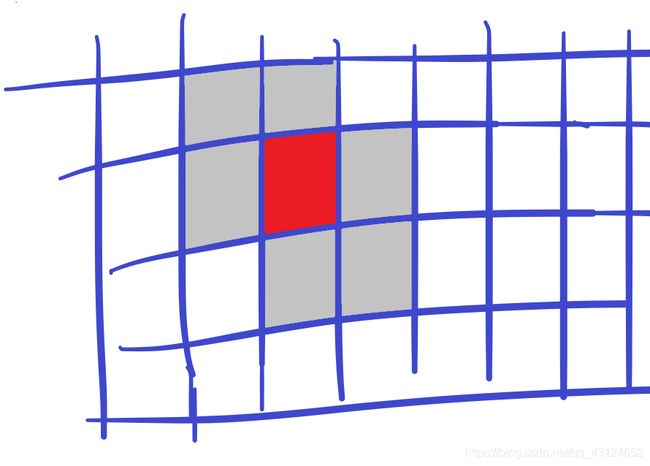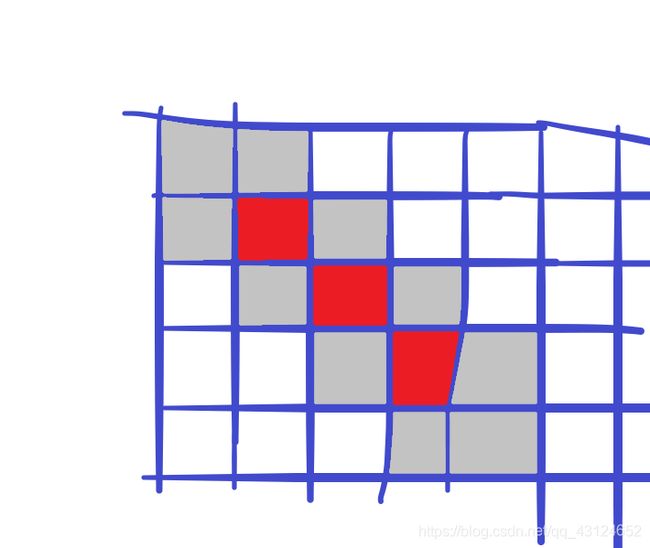Codeforces Global Round 8abcd简单题解
A. C+=
B. Codeforces Subsequences
C. Even Picture
D. AND, OR and square sum
A. C+=
题意:
给你t组测试用例,每组测试用例三个正整数a,b,n;
每次操作能使a+=b或b+=a;
问最少几次操作使得a或b严格大于n;
数 据 范 围 : a , b , n ( 1 ≤ a , b ≤ n ≤ 1 0 9 ) 数据范围: a,b,n (1≤a,b≤n≤10^9) 数据范围:a,b,n(1≤a,b≤n≤109)
我的理解:
贪心每次操作,让min(a,b)+=max(a,b);
代码:
#include B. Codeforces Subsequences
题意:
给你一个正整数k;
求最短的字符串包含至少k个"codeforces"个子序列;
数 据 范 围 : k ( 1 ≤ k ≤ 1 0 16 ) 数据范围:k (1≤k≤10^{16}) 数据范围:k(1≤k≤1016)
我的理解:
总所周知:
“ccodeforces"包含两个"codeforces”;
“ccoodeforces"包含四个"codeforces”;
“ccooddeforces"包含八个"codeforces”;
代码:
#include C. Even Picture
题意:
在一个无限大的网格中;
给你一个正整数n;
画出一个灰色联通区域,使得
1.每个灰色格子有偶数个灰色格子与之相邻(0,2,4);
2.恰好有n个灰色格子有4个与之相邻的灰色格子(就是g[x,y],g[x+1,y],g[x,y+1],g[x-1,y],g[x,y-1],都是灰色使有n个这样的g[x,y],并满足条件1);
数 据 范 围 : n ( 1 ≤ k ≤ 500 ) 数据范围:n (1≤k≤500) 数据范围:n(1≤k≤500)
输出k(灰色格子的数量)
k行,每行一个灰色格子的坐标
我的理解:
手玩,显然:
当n=1时:
当n=3:

代码:
#include D. AND, OR and square sum
题意:
给你一个长度为n的数组a,你可以执行任意次以下操作:
选择1<=i,j<=n
令:x=a[i],y=a[j]
a[i]=x&y;a[j]=x|y;
求 ( M A X ) s u m = Σ i = 1 n a [ i ] 2 求(MAX)sum=\Sigma_{i=1}^{n}a[i]^2 求(MAX)sum=Σi=1na[i]2数据范围: n ( 1 ≤ n ≤ 2 ⋅ 1 0 5 ) n (1≤n≤2⋅10^5) n(1≤n≤2⋅105) a 1 , … , a n ( 0 ≤ a i < 2 20 ) a1,…,an (0≤ai<2^{20}) a1,…,an(0≤ai<220)
我的理解:
&和|操作一起,就是一个swap操作,使a[i]和a[j]在二进制下交换所在位
所以数组a中的1总量不变
那么我们就可以贪心使大数尽量的多
代码:
#include 未完待续~!@#¥%……